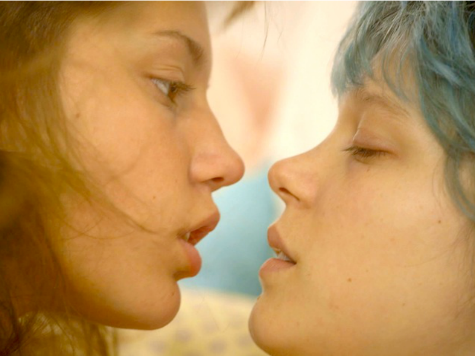By JOCELYN NOVECK
AP National Writer
NEW YORK
“Blue is the Warmest Color” arrives in the United States from France this week–and it’s bringing along some baggage.
On the plus side, the intense and soulful lesbian romance carries a Palme D’Or from Cannes, awarded not only to director Abdellatif Kechiche but, in a rare gesture, to his lead actresses, who received effusive praise from jury head Steven Spielberg. It’s also done boffo box office in France.
On the more complicated side, it carries a whiff of scandal–in the form of bitter post-Cannes remarks from the stars about their working conditions–most notably actress Lea Seydoux’s complaint in an interview that Kechiche made her feel “like a prostitute” during filming. Kechiche fired back that, well, maybe the movie just shouldn’t be released at all.
Which brings us to … oh yes! The sex scenes.
All this sex talk threatens, in the view of the film’s breakout star, Adele Exarchopoulos, to overpower reaction to the rest of the movie–which, at three hours long, has been praised by many as a singular achievement in its raw, visceral depiction of both the hypnotic power and horrible pain of a first love.
“You know, these scenes are just like the other ones, and we ask people to respect that,” says Exarchopoulos, 19, speaking in a recent interview at a Manhattan hotel, and employing a rather charming mix of confident and halting English. “I understand totally if you don’t like this scene or you are uncomfortable with it, because I know … I myself am too!
As for popular reaction in the United States, Exarchopoulos is, as they say, cautiously optimistic.
Both Exarchopoulos and Seydoux, almost a decade her senior at 28, have been praised for their courage and their skill. But Exarchopoulos has been the revelation: She’s in virtually every frame of the film, which follows close to a decade in the life of a young woman–not coincidentally, named Adele–in northern France. One day, she spies a blue-haired woman, Emma, on the street (hence the `Blue’ in the title) and is overpowered by the attraction she feels, something she’s never felt for a man, or anyone. It’s the story of an awakening: romantic, sexual, intellectual, even spiritual.
But the romance is tested by other forces: Class and culture. Emma is an artist, from a liberal, bohemian family. Adele comes from a more conservative background, and wants to be a kindergarten teacher, rather than the writer Emma wants her to be. The two ultimately clash, painfully and violently.
To hear Exarchopoulos talk, the devastating breakup scene was even harder than the sex scenes. Both actresses have said the director demanded take after take of a scene–including a good week of shooting the naked sex scenes. He’s said to have amassed hundreds of hours of footage.
“Yes, he did a lot, a lot, a lot of takes,” Exarchopoulos says. “And there were scenes we shot that didn’t make the movie, even MORE intense. Kechiche, he wanted to capture your soul.”
The Tunisian-born director acknowledges his exacting style.
As for Seydoux’s particularly harsh comments, Kechiche adds a mysterious footnote: “I think what happened after Cannes was orchestrated by people who are not really out for my well being. I think Lea in particular was manipulated by these people.” (Seydoux was not in New York to promote the film.)
One thing Kechiche takes back, though, is his remark to a British newspaper that the film maybe shouldn’t be released at all. “I had that spontaneous response at the moment of the interview,” he said. “It wasn’t more thought out than that. But now, when I feel bitter, I remember that the film did after all get the Palme d’Or–and from a mythical director, Steven Spielberg.”
Exarchopoulos, who clearly has a huge future, says she wishes the recriminations–she, too, made complaints–had stayed behind the scenes. She says she might even work with Kechiche again–“but not yet.”
“Some directors take three takes, and they don’t even watch you,” she says. “I prefer someone who asks a lot of me, but gives a lot.”
In the end, she has no regrets, Exarchopoulos says. And she’s looking ahead–to success, but failure, too.
“Nothing is guaranteed,” she says. “And failure is important, too. I have a lot to prove to myself.”
“I am only 19,” she adds. “I am going to enjoy it all.”

COMMENTS
Please let us know if you're having issues with commenting.